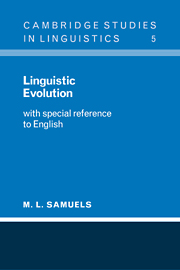
-
Select format
-
- Publisher:
- Cambridge University Press
- Publication date:
- June 2012
- November 1972
- ISBN:
- 9781139086707
- 9780521099134
- Dimensions:
- Weight & Pages:
- Dimensions:
- (229 x 152 mm)
- Weight & Pages:
- 0.325kg, 216 Pages
You may already have access via personal or institutional login
Book description
Professor Samuels presents a comprehensive explanation of the reasons for linguistic change, applying his theory in particular to the history of English. He assesses and mediates between the conflicting dogmas of different schools of linguistics, and offers an alternative theory of linguistic change which is basically simple but has the scope to cover any type of change.
Reviews
'Michael Samuels's neat and careful monograph marks a considerable advance on the presentations of other distinguished scholars inasmuch as it is better balanced and more readable. It is better balanced because it observes a right proportion between abstract and concrete, between scientific description and accompanying exemplification. It is more readable and more easily assimilable because its author takes care to explain technical terms accurately and unobtrusively on their first appearance and to list them with complete references in an exceptionally well-organized subject index - a model of its kind … The author illustrates freely from the classical languages, from the languages of Western Europe with their long recorded histories, and, above all, from the dialects of late Middle English, on which he is probably unrivalled as an authority … this book bears the hallmark of excellence. It embodies the findings of many years of patient research.'
Source: The Times Literary Supplement
'For the serious study of language, indispensable … Samuels (University of Glasgow), one of the better British linguists, is well informed, philosophical, judicious. His is the only extended scholarly study of the processes of language growth to utilize modern research, notably in linguistic geography … With him, evolution does not concern the origin or prehistory of language. He works with current and survived evidence, especially from Middle English and more recent British dialects, combining cultural with linguistic materials to describe the causes and directions of language change. The result is the best book in its area.'
Source: Choice
'Linguistic Evolution should succeed as an introductory text. Samuels has struck a rare balance between clarity and penetrating analysis. He has contributed towards the re-establishment of historical linguistics as a challenging discipline, something worth doing. In conclusion, the excellence of the technical presentation makes the book an absolute pleasure to handle.'
Source: Unisa English Studies
Contents
Metrics
Full text views
Full text views help Loading metrics...
Loading metrics...
* Views captured on Cambridge Core between #date#. This data will be updated every 24 hours.
Usage data cannot currently be displayed.
Accessibility standard: Unknown
Why this information is here
This section outlines the accessibility features of this content - including support for screen readers, full keyboard navigation and high-contrast display options. This may not be relevant for you.
Accessibility Information
Accessibility compliance for the PDF of this book is currently unknown and may be updated in the future.


